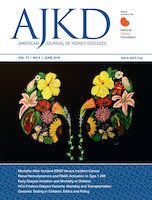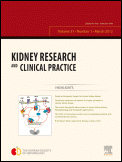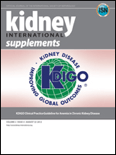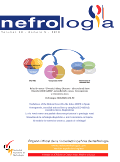
AMERICAN JOURNAL OF KIDNEY DISEASES
Scope & Guideline
Pioneering Discoveries: Your Gateway to Kidney Health Excellence
Introduction
Aims and Scopes
- Clinical Nephrology and Patient Management:
Focus on clinical studies that explore the management of kidney diseases, including chronic kidney disease (CKD), acute kidney injury (AKI), and end-stage renal disease (ESRD), with an emphasis on patient-centered outcomes. - Transplantation and Immunology:
Research on kidney transplantation, including donor-recipient compatibility, immunosuppression strategies, and post-transplant outcomes, highlighting the immunological aspects affecting kidney graft survival. - Epidemiology and Public Health:
Studies addressing the epidemiology of kidney diseases, risk factors, and public health implications, particularly among diverse populations, to inform healthcare policies and improve access to kidney care. - Innovative Therapies and Treatment Modalities:
Exploration of novel therapeutic approaches, including pharmacological interventions, dietary modifications, and technological advancements in dialysis and kidney replacement therapies. - Health Disparities and Social Determinants:
Investigating health disparities related to kidney disease, focusing on the impact of socioeconomic factors, race, and access to care on kidney health outcomes. - Genetics and Molecular Biology:
Research that delves into the genetic underpinnings of kidney diseases, including rare genetic disorders and their implications for diagnosis and treatment.
Trending and Emerging
- Telehealth and Remote Monitoring:
The COVID-19 pandemic accelerated the adoption of telehealth services in nephrology, with an emphasis on remote patient monitoring and virtual care models to improve access and adherence to treatment. - Patient-Centered Care and Shared Decision-Making:
A growing focus on patient-centered approaches that emphasize shared decision-making in treatment options, reflecting an increased awareness of the importance of patient preferences and experiences in managing kidney disease. - Health Equity and Social Determinants of Health:
Research addressing health equity issues and the impact of social determinants on kidney health outcomes has gained significant attention, aiming to identify barriers and improve care for underserved populations. - Artificial Intelligence and Machine Learning Applications:
Emerging applications of artificial intelligence and machine learning in nephrology, particularly for risk prediction, diagnosis, and personalized treatment strategies, are becoming increasingly prevalent. - Nutritional Interventions in CKD Management:
An increased focus on dietary management and nutritional interventions for patients with CKD, emphasizing the role of nutrition in managing kidney disease progression and related comorbidities. - Genetic and Genomic Studies:
There is a rising interest in genetic and genomic research related to kidney diseases, including studies exploring the genetic basis of conditions like APOL1-mediated kidney disease and personalized medicine approaches.
Declining or Waning
- Traditional Dialysis Methods:
Research focusing solely on traditional hemodialysis methods has decreased as newer modalities and home dialysis options gain traction, indicating a shift towards exploring more innovative and patient-centered approaches. - Single-Cause Nephropathies:
There has been a waning interest in studies that focus exclusively on single-cause nephropathies without considering broader systemic implications and multifactorial interactions, as the nephrology community increasingly recognizes the complexity of kidney diseases. - Historical Perspectives on Kidney Disease:
The journal has seen fewer submissions centered around historical reviews or perspectives on nephrology, suggesting a trend towards more contemporary and forward-looking research. - Pharmacological Toxicity Studies:
Research specifically on pharmacological toxicity related to older medications has diminished, as newer therapeutic agents and their safety profiles become the focus of interest. - Basic Science Without Clinical Correlation:
There is a noticeable decline in basic science research that does not have direct clinical relevance, as the journal emphasizes translational research that bridges laboratory findings with clinical applications.
Similar Journals

KIDNEY INTERNATIONAL
Transforming knowledge into practice in nephrology.KIDNEY INTERNATIONAL is a leading journal in the field of nephrology, published by Elsevier Science Inc, renowned for its rigorous peer-review process and high-quality research contributions. Established in 1972, this distinguished journal serves as a vital platform for disseminating groundbreaking findings and innovative methodologies that advance the understanding and treatment of kidney-related conditions. With an impressive impact factor reflected in its Q1 category ranking in nephrology and a high Scopus rank of #3 out of 81, it comfortably sits in the top tier of academic literature. Although it offers traditional subscription access, KIDNEY INTERNATIONAL maintains its reputation for excellence by engaging an audience of researchers, healthcare professionals, and students dedicated to improving renal health. The journal is committed to publishing articles that address pressing challenges in nephrology, making it an essential resource for those seeking to enhance their knowledge and practice in the field.

International Journal of Nephrology and Renovascular Disease
Innovating nephrology: Where research meets practice.The International Journal of Nephrology and Renovascular Disease is a prestigious peer-reviewed journal dedicated to advancing the field of nephrology and related renal research. Published by DOVE MEDICAL PRESS LTD, this open access journal has been a vital resource for the nephrology community since its inception in 2008. With a focus on innovative studies and emerging trends, the journal has established itself in the scholarly landscape, achieving an impressive Q2 ranking within the nephrology category according to the 2023 Scopus metrics, and positioning itself at rank #33 out of 81 journals in the field. The journal aims to provide a platform for both established researchers and emerging scholars to share their findings and insights, significantly contributing to improving patient outcomes and enhancing the understanding of renal health. As it continuously seeks to publish high-quality research that reflects the latest developments in the discipline, the International Journal of Nephrology and Renovascular Disease serves as an indispensable tool for anyone involved in nephrology research, clinical practice, and education.

Saudi Journal of Kidney Diseases and Transplantation
Catalyzing knowledge exchange in renal science.Saudi Journal of Kidney Diseases and Transplantation, published by Wolters Kluwer Medknow Publications, serves as a vital resource in the fields of nephrology and transplantation, dedicated to advancing the understanding and treatment of kidney diseases. With an ISSN of 1319-2442 and E-ISSN 2320-3838, this esteemed peer-reviewed journal aims to facilitate scholarly exchange and promote innovative research since its inception in 2006. Recognized for its Open Access model since 2007, it enables widespread dissemination of critical findings, thereby enhancing the global impact of kidney-related research. With a solid reputation reflected in its current Q3 categorization in both Nephrology and Transplantation for 2023, the journal continues to contribute meaningfully to these essential medical fields. Researchers, clinical professionals, and students can access its wealth of information to further their knowledge and practice in kidney health and organ transplantation, vital components in the landscape of modern medicine.

Kidney Research and Clinical Practice
Fostering collaboration for a healthier tomorrow.Kidney Research and Clinical Practice is a premier open-access journal dedicated to advancing the field of nephrology and urology, published by the Korean Society of Nephrology. Established in 1982, this journal serves as a vital platform for researchers, clinicians, and students by disseminating pioneering research, reviews, and case studies that address significant challenges in kidney health and disease management. With a commendable Q1 ranking in both nephrology and urology categories in 2023, and an impressive standing in Scopus rankings (Rank #30/120 in Urology and #26/81 in Nephrology), the journal plays a critical role in shaping contemporary discussions and innovations in these fields. As an open-access publication, Kidney Research and Clinical Practice ensures wide-reaching visibility and accessibility, fostering collaboration and knowledge-sharing within the global medical community. For those looking to deepen their understanding of renal science and improve clinical practices, this journal is an invaluable resource.

Revista de Nefrologia Dialisis y Trasplante
Innovating nephrology: where research meets practice.Revista de Nefrologia Dialisis y Trasplante (ISSN: 0326-3428; E-ISSN: 2346-8548) is a prominent open-access journal published by the ASOC REGIONAL DIALISIS TRASPLANTES RENALES since 2013, located in Buenos Aires, Argentina. This journal serves as a vital platform for the dissemination of pivotal research findings in the fields of nephrology and transplantation, covering a wide range of topics including clinical practices, patient outcomes, and innovative therapies. Although currently ranked in the Q4 category in both Nephrology and Transplantation by Scopus, the journal aims to elevate the discourse within these scientific communities by providing accessible and high-quality research to professionals and researchers alike. With its commitment to advancing knowledge and fostering collaboration among scientists, practitioners, and students, the Revista de Nefrologia Dialisis y Trasplante plays an essential role in addressing the critical challenges and developments in kidney health and organ transplantation.

CLINICAL NEPHROLOGY
Elevating clinical practices in kidney care.CLINICAL NEPHROLOGY is a prestigious academic journal dedicated to advancing the field of nephrology and related areas of medicine. Published by DUSTRI-VERLAG DR KARL FEISTLE, this journal has been a critical resource for researchers and practitioners since its inception in 1973, with a commitment to disseminating high-quality, peer-reviewed articles that provide insights into clinical practices, innovative treatments, and emerging research in kidney diseases. With an ISSN of 0301-0430, CLINICAL NEPHROLOGY stands out in the medical community, achieving a commendable Q3 ranking in both general medicine and nephrology fields as of 2023. The journal's focus on both clinical application and rigorous scientific inquiry makes it an essential read for healthcare professionals and researchers looking to stay at the forefront of nephrology advancements. Although it operates under a subscription model, its broad scope promises invaluable contributions that address practical challenges and foster interdisciplinary dialogue within the healthcare landscape.

Nature Reviews Nephrology
Exploring the frontiers of kidney health and disease.Nature Reviews Nephrology is a prestigious academic journal published by NATURE PORTFOLIO, focusing on the rapidly evolving field of nephrology. As a leader in its category, it holds an impressive Q1 ranking in the 2023 category for Nephrology and ranks #1 out of 81 in the Scopus metrics, reflecting its high impact and relevance within the scientific community, with a staggering 99th percentile ranking. Established in 2009, this journal provides in-depth reviews, critical analysis, and cutting-edge research updates, making it an essential resource for researchers, professionals, and students alike. With an accessible Open Access policy, it enhances the dissemination of knowledge, ensuring that vital research in renal health and disease reaches a wide audience. Situated in the United Kingdom, Nature Reviews Nephrology remains committed to advancing understanding and treatment in nephrology, emphasizing the importance of this area of study in improving patient outcomes globally.

Kidney International Supplements
Shaping the future of nephrology with impactful studies.Kidney International Supplements is a prestigious academic journal published by Elsevier Science Inc, specializing in the field of nephrology. With an impressive impact factor and ranked in the top percentile, it holds the esteemed position of Q1 in nephrology categories, reflecting its influential contribution to the academic community. Throughout its publication history from 2011 to 2022 and in the anticipated 2024 edition, the journal has provided a vital platform for disseminating high-quality research and insights, catering to professionals, researchers, and students dedicated to advancing kidney health. While it offers traditional access options, the journal is committed to promoting the highest standards of research integrity and innovation in nephrology. The journal plays an essential role in shaping the future of kidney disease treatment, levelling knowledge exchange across specialties, and fostering collaboration among experts in the field.

JOURNAL OF NEPHROLOGY
Empowering professionals with cutting-edge nephrology research.JOURNAL OF NEPHROLOGY is a premier academic journal dedicated to the field of nephrology, published by Springer Heidelberg. With its ISSN 1121-8428 and E-ISSN 1724-6059, this journal serves as a dynamic platform for disseminating high-quality research and groundbreaking findings in kidney health and disease. Since its inception in 1989, it has established itself as a vital resource for professionals, researchers, and students, consistently ranking in the top quartile (Q1) of nephrology journals and securing an impressive Scopus rank of #19 out of 81, placing it in the 77th percentile. Although it operates under a subscription model, the journal fosters an inclusive academic environment where critical discussions and innovative approaches to nephrological challenges are encouraged. With a commitment to advancing knowledge and practice in nephrology, JOURNAL OF NEPHROLOGY remains an essential resource for anyone who seeks to stay at the forefront of kidney research and clinical care.

NEFROLOGIA
Fostering dialogue for a healthier tomorrow in nephrology.NEFROLOGIA is a preeminent scientific journal published by the SOCIEDAD ESPAÑOLA DE NEFROLOGÍA DR. RAFAEL MATESANZ, specializing in cutting-edge research and clinical advancements in the field of nephrology. Established in 1981 and continuing through 2024, this journal serves as a crucial platform for nephrologists, researchers, and healthcare professionals to disseminate knowledge and foster dialogue on critical issues affecting kidney health. With its ISSN 0211-6995 and E-ISSN 1989-2284, NEFROLOGIA is indexed in prestigious databases, ranking #35 out of 81 in the Scopus Medicine Nephrology category, reflecting its significance within the medical community. Although it does not currently offer open access, the journal ensures wide accessibility and readership through institutional subscriptions. Researchers and clinicians are invited to contribute their findings and reviews, advancing our understanding and treatment of renal diseases. Through its commitment to high scholarly standards and impactful research, NEFROLOGIA remains a vital resource for those dedicated to improving kidney care and advancing nephrology sciences.